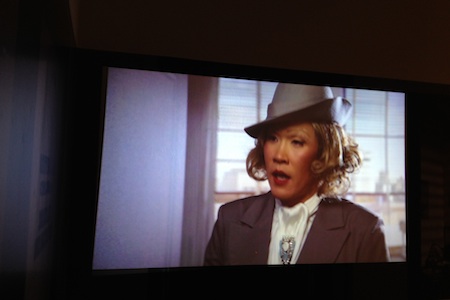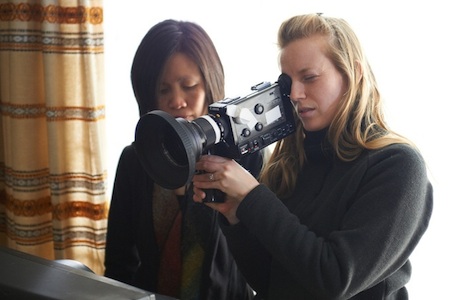The Toronto International Film Festival is now thoroughly branded as TIFF, the word rolling off the lips of local Torontonians as though it had always been a proper name for a festival, not the word for an argument. This year, the festival is generating its share of “tiffs” on screen, too, as some of the best and most invigorating films—at least, those that this critic happened to catch among the crushing glut of titles on offer—raise the stakes on our views of the past and present, air unsettled debates and challenge viewers to rethink options, reconsider ideas, even rethink cinematic forms. I can’t remember when I’ve had such a stimulating time at the movies, coming back each night to pull another book off my host’s bookshelf to add to the basic knowledge that a simple press kit can proffer. The Toronto present is haunted this year by the past, just as our lives off-screen are haunted by the memories and histories stirred up there.
As the festival got underway, I traveled across town, far from the new downtown where TIFF’s Bell Lightbox building anchors a new neighborhood of high-rise condominiums to the new western hipster district where the Gladstone Hotel was hosting artist Ming Wong’s seven-channel video installation, Making Chinatown. In this magical remaking of Polanski’s Chinatown, Ming Wong plays a range of roles from Jack Nicholson’s Jake Gittis to Faye Dunaway’s Evelyn Mulwray. A fascinating inquiry into race and gender, it also functions as a sort of séance for Hollywood ghosts. Maybe Chinatown was a neo-noir, but it was also a reminder that the corrupt Los Angeles water wars still prevail and rule California, with new skirmishes going on right now in 2012. Those who cannot remember the past…you know the quote. Take it as an introduction to this year’s TIFF where armistice is never in sight and the past is remarkably, repeatedly, unsettled.
This year, TIFF has been framed by two events out of its control. Immediately upon arriving, I spotted the red buttons. “Free Orwa,” they read. On August 23, Orwa Nyrabia, Syrian documentary producer and director of the DOX BOX Film Festival, was kidnapped at the Damascus airport. TIFF and numerous other film festivals and personalities have issued protests to the Syrian government: Nyrabia is a well-known and much-loved figure in contemporary film circles. Orwa Nyrabia’s disappearance cast a shadow on the start of the festival. On the morning of September 12, news reports cast a very different shadow over its final days: the assassination on September 11 of the U.S. ambassador to Libya, the murder of several of his staff, and attacks on the Consulate in Benghazi as well as the U.S. embassy in Cairo, all in response to a poisonous hate-filled “film” of murky provenance. So, dear reader, welcome to the world of world cinema and its consequences.
Follies, Families, and the Politics of the Heart
If the family has long been a microcosm for how histories inform the present, then Sarah Polley’s Stories We Tell is a veritable case study in its mechanisms. A rare mix of intriguing details and delightful executions, Stories dissects the backstory of the Polley family. Director Sarah Polley herself is the focus, due to a recurrent family joke about her paternity. After her mother’s death, Polley was raised in the bosom of a visibly affectionate and supportive clan presided over by daddy Michael, who never remarried. Clearly bonded to him, Polley is pained when she must confront questions about her true parentage and her mother’s behavior.
It’s how she goes about this investigation that makes Stories We Tell so exceptional, as an unbelievable plethora of home movies from the ’70s trace the arc of her mother’s life from happiness to disillusion and back. Roadside Attractions has just picked it up for U.S. distribution. However much of a treat it will be for American audiences, though, nothing can beat seeing the film in Toronto with Polley, her fathers and siblings. Answering a question, Polley admitted the film wasn’t just about her father but her mother, too, who died when she was 11. “Who gets this?” she wondered. “I don’t know anyone else who lost their mother young who got to sit with everyone who ever knew her for days at a time and ask them everything I wanted to know!” And just about everything an audience would want to know, too. Haunted by the past, Polley has hauled her story onto the screen with unflagging poise, a hybrid documentary-fiction style, and one terrific sense of humor.
TIFF, always loyal to its auteurs, had two of them turn up with autobiographical tales remade as period dramas. Mark my word: It looks like the 1960s and ’70s are back, this time in the memories of the people who actually lived through them. Sally Potter’s Ginger and Rosa and Olivier Assayas‘ Aprés Mai (Something in the Air) are close-up views of young people in 1962 and 1972 respectively, made and unmade by cultural upheaval. Both filmmakers clearly have something at stake in the stories they explore, opening up an era of their own formation to unpack its rewards and damages.
Ginger and Rosa, Potter’s best film since Orlando, has arrived on that film’s 20th anniversary with a lot on its mind. To sum up: nuclear family, nuclear politics. It’s the Ban the Bomb era and the Cuban Missile Crisis is on teenaged Ginger’s mind, nuclear annihilation in her psyche. Her best friend Rosa, alas, is in search of a daddy in all the wrong places, including Ginger’s daddy’s bed. Elle Fanning is spectacular as troubled Ginger, with newcomer Alice Englert (a.k.a. Jane Campion’s daughter) terrific as the sexy Rosa. Fanning wept on stage, expressing her respect for Potter and charming the crowd, many of whom were there for Christina (Mad Men) Hendricks, playing Ginger’s mother. Alessandro (Laurel Canyon) Nivola is suitably creepy as a free-love, anything-goes dad who thinks his own daughter’s BFF is fair game. The film rests on the incandescent performances of the young women whose friendship comes undone and, though its ending could be better finessed, Ginger and Rosa offers substantial insights into love, lust and the roots of radical politics.
Assayas looks back through the decades and settles on 1972. As the French title declares, that’s after May ’68. Set in the milieu of Parisian radical youth who paint all day and spray graffiti all night, Something in the Air unties the knots binding together radical politics, sexual liberation, drugs and creativity. A decade later than Potter’s setting, a grown-up Ginger would fit in well with the crowd Assayas constructs here, complete with demonstrations, police actions, and hippie drug-fests. With Carlos under his belt, Assayas seems emboldened to examine his own evolution. His alter ego in the film, Gilles (Clement Metayer), starts as a painter and revolutionary, then slowly becomes a budding filmmaker. There’s a lovely conceit at the very end, when Gilles learns the fate of his lost love via an experimental film screening at the once-legendary Electric Cinema in London which eerily, like the party house in the film, burned down recently. Assayas, like Potter, creates a compelling narrative that hinges on how the political can be both a cause and a stand-in for passions rooted in the heart and body.
Compelling Women, Compelling Histories
The year 1972 figures in a completely different retelling of history, representing the same turbulent period through documentary in the case of one of the most famous figures in U.S. political history, Angela Davis. In Free Angela & All Political Prisoners, filmmaker Shola Lynch has chosen to focus on the trial of Davis rather than on her life overall. Lynch sets up the situation, from then-California-governor Ronald Reagan’s pressure to fire Davis from her UCLA professorship to her involvement in the movement for prison reform and on behalf of the “Soledad brothers” whose prison escape attempt on August 7, 1970, led to a half dozen murders and to a call for the arrest of Davis. Nabbed by the FBI while she was underground, Davis sits in prison for months until the death penalty is repealed and she’s freed to prepare for her trial outside the prison walls—and is then acquitted of all charges in 1972.
Free Angela is a peculiar film in that it focuses steadfastly on the trial and legal issues, yet resolutely refuses to put any meat on the bones of its central characters. There are excerpts from what seems a brief contemporary interview with Davis, but we never learn much about her: the archival interview in last year’s Black Power Mix-Tape was more impressive. We want to now more about Davis’s mother, who’s so articulate and capable, and more about her sister Fania, who rallies the troops; we want to hear more about Davis’s lifelong friend Bettina Aptheker, about a white farmer who posts bail, Rodger McAfee; and even about David Poindexter, the man with whom Davis was captured at a Howard Johnson motel in New York. Lynch denies us details that would make the film breathe and sing and penetrate our hearts. Instead, however perplexing and fragmented, Free Angela is still worth seeing for its archival research and vivid sense of its times.
By contrast, the great German filmmaker Margarethe Von Trotta shows how ideas can indeed be brought to life, in her case through a period drama on Hannah Arendt. Like Lynch, Von Trotta focuses on just a few years in her subject’s life. Surveying a different politics altogether, Von Trotta displays an approach to the horrors of history rooted in an intelligence that can be felt, passionately, right down to the bone. Hannah Arendt is set in the era of Sally Potter’s film, roughly 1960-63 in this case, in New York City. Von Trotta traces a politics that at its very core was still fighting the battles left unsettled by the end of World War II. Famous for her postulation of “the banality of evil” when she reported on the Adoph Eichmann trial for the New Yorker, Arendt (embodied by Von Trotta regular Barbara Sukowa) comes across as a fascinating figure, a philosopher struggling over questions of morality while teaching, arguing, eating, drinking and pursuing a lovely friendship with, of all people, Mary McCarthy. What a terrific glimpse of intellectual life in New York in the early ’60s. And what a cautionary tale about the price of honor, the consequence of staking one’s reputation to an unpopular moral position. When Arendt concluded that Eichmann was “a nobody” that could have been anyone, she outraged many; when she pointed out that some Jews had been complicit with the Nazis, she outraged even more. Von Trotta’s success lies in making us understand why she did it.
The lessons of history don’t come cheaply. Free Angela clarifies the power of Reagan’s conservative ‘revolution’ despite the provisional victory won by Angela Davis. Hannah Arendt clarifies the roots of the fights that have continued to divide the American Jewish community ever since: an insistence on victimhood and purity. The refusal to brook any argument that would challenge a sacred position may have begun with Holocaust history but live on through Middle East politics and the fights over Israel and Palestine. Anyone wanting a primer on evidence and histories would have done well to spend time at TIFF this year, for there’s been a terrific group of Palestinian and Israeli films that could lead to a realignment of public opinion if the public ever gets a chance to see them.
The Worlds Not Ours
A broad U.S. public will get that chance with Dror Moreh’s The Gatekeepers since Sony Classics is releasing this documentary on the history of Shin Bet, as told through interviews with all the living heads of the Israeli state security agency. Exhaustive and fascinating in its details, The Gatekeepers is a revelation that may well show more than intended. The former spy-service heads tell the tales of past wars, skirmishes, the start of suicide bombs, the Intifadas, proudly relating their tactics of surveillance. Shots of the security archives, overwhelming repositories of secrets and a sheer overload of data, are reminiscent of the Stasi in fiction films. And then, the unthinkable: the assassination of Israeli Prime Minister Yitzhak Rabin in 1995 by extremist Yigal Amir, intended to derail the Oslo peace process, an aim which it spectacularly achieved, changing the course of history to move Israel far to the right. One of the former spymasters relates his subsequent investigation into Israel’s Jewish terrorists, a significant departure for an agency bent on investigating Palestinians. And then what? He discovers their leaders and at the same time their links to the highest levels of Israeli government. He arrests and charges them. They’re pardoned. Even Amir is discharged after serving little time. These disclosures shock the audience. Moreh pulls back, as if he scared himself, to return to the former narrative of danger from Palestinians and Arabs, but the cat’s out of the bag: Now we know. It’s a chilling history lesson and one I won’t soon forget.
At times, it seemed as if the Mideast conflicts were playing out not in the halls of the United Nations or the West Wing, but rather in the TIFF cinemas where film after film debuted. This year’s Participant entry, State 194, has the same steadfast logic of The Gatekeepers: instead of Israeli security, though, it’s Palestinian Prime Minister Salam Fayyad and his plan to win statehood for Palestine by building an infrastructure of civil society and institutions. Mission accomplished! Offscreen, though, the U.S. uses its threat of a Security Council veto to keep the measure from coming to the floor of the General Assembly, where it’s already been assured of passage. No viewer can fail to react with dismay at the prospect of its defeat. We see Netanyahu fly around the world denouncing the statehood quest, effectively kneecapping Fayyad’s efforts.
In Mahdi Fleifel’s A World Not Ours, we’re given a glimpse of the people whose lives have been eternally sidelined by these conflicts: the Palestinian refugees of the Ain El-Helweh refugee camp in Lebanon. Raised in Denmark and living in London, Fleifel grew up spending summer in the camp where his grandfather and an uncle still live; his bittersweet portrait supplies the heartbreak invisible in State 194 and unacknowledged in The Gatekeepers. It shows the terrible, terrible consequences of an unresolvable situation that has reduced a people’s entire lives to a zero-sum waiting game. And finally, a fiction film, The Attack, put together the pieces set in motion by the other three: In its narrative, a Palestinian surgeon at a Tel Aviv hospital is traumatized by the discovery that his wife has died in a suicide bombing, not as a victim but as a perpetrator. As he journeys into his own ‘heart of darkness,’ the occupied West Bank, he comes face to face with terrible contradictions that force him to reassess his life. The key? The massacre of Palestinians by Israeli troops in Jenin ten years ago, an event which Israel has denied ever occurred. Ziad Doueiri is a good filmmaker: Though The Attack is a bit heavy-handed, it leaves its protagonist morally stranded and its viewer in a state of profound unease. With such unresolvable histories, what lies ahead?
The Film that Will Take Your Breath Away
And now, finally, the film that put everything together into one shocking, transporting, unprecedented package: The Act of Killing. This is the film that people will be leaving the festival talking about and trying to catch up to, to debate, to understand.
Cast your mind back to 1965: Three years after Eichmann’s death by hanging, Indonesia underwent a military coup. It was followed by the massacre of over one million (or, half a million, by some counts) people by bloodthirsty militias in 1965-66 whose targets ranged from alleged Communists to ethnic Chinese. In The Act of Killing, the actual perpetrators boast about their activities and restage their crimes for the camera, dressing up in costumes, building sets, and conscripting actors. These are the “gangsters,” a term they all insist derives from the English for “free men,” and they have modeled themselves on movie characters. One learned to kill with a wire from movies about Mafia killings, for instance. They like noir and cowboys. They even stage music videos, set in fantasy landscapes. But mostly, over and over, they relate the torture they inflicted and the people they kill.
And the filmmakers? They film. Director Joshua Oppenheimer, with co-director Cynthia Cynn and co-director Anonymous, has made a remarkable document that raises profound questions about movie-making, politics, and national morality. The perpetrators have never been punished; instead, they are heroes, interviewed on television, employed at the highest levels of society, seemingly prosperous and respected—even one who likes to dress in drag for the filmed pageants when he’s not playing a heavy in his gangster drag.
The film’s dramatic denouement hinges on its central character, gangster hero Anwar Congo, whose reaction to the reenactments takes an unexpected turn. Congo is not the only one implicated here: so are American movies, which paradoxically turn out to play a big role in Indonesian history. For me, The Act of Killing was the ultimate discovery of the festival, for its impact surpasses the audience’s ability to absorb it and its surplus value has haunted me long past the screening was over.
Final Hauntings
A ghost turns up in the last section of The Act of Killing, a scarey one in wild black feathers and a fierce mien, straight out of the nightmares that have begun to plague Congo at night when his defenses are down. And suddenly I remembered other ghosts: those in Apichatpong Weerasethakul’s Mekong Hotel who roam the rooms of a crumbling building on the Mekong River, where the filmmaker prepares his film, a composer plays his guitar, and a strange woman, a ghost that’s taken over a mortal body, searches for human flesh. Between her attacks and feedings, we hear the story of the Laotian exiles who once took shelter on these shores.
Ghosts everywhere. And then, suddenly, one less. Reports surfaced on Thursday that Orwa Nyrabia was free, released by Military Security after a civilian court found him not guilty, his release perhaps a response to international outrage. And the spurious “film” that has set off riots and killings? A fraud, perpetrated by an ex-con using a pseudonym. As the festival draws to an end, the line between fact and fiction off-screen has grown distressingly muddled. Good news, bad news, plenty of stories to go around. And enough ghosts to haunt them all.







